#william the conqueror king of England
Explore tagged Tumblr posts
Text
William the Conqueror conquers England and becomes its king...
Rollo, Gisla and Charles in the afterlife...

Ecbert and Ragnar...


Aethelwulf, Kwenthrith and Aelle...

Eh, my dear Ecbert and Ragnar... what goes around, comes around.
#vikings#vikings valhalla#vikings charles#vikings gisla#vikings rollo#vikings ragnar#vikings ecbert#vikings aethelwulf#vikings kwenthrith#vikings aelle#emperor charles ii the bald of west frankia#gisla princess of frankia and duchess of normandy#duke rollo of normandy#duke william of normandy#william the conqueror king of England#king ecbert of wessex#king aethelwulf of wessex#queen kwenthrith of mercia#king aelle of northumbria#rollo gisla and charles must be so proud of their descendant william#ecbert and ragnar pissed oc#while aethelwulf kwenthrith and aelle must be laughing their ass off at them#vengeance sweet vengeance
16 notes
·
View notes
Text






First look at the upcoming series “King and Conqueror” which will be about the invasion of William of Normandy and the subsequent conquest of England. Coming in 2025 on BBC, with Nikolaj Coster-Waldau and Clémence Poésy as William I and Matilda of Flanders.
#king and conqueror#bbc#William I of Normandy#Matilda of Flanders#William I of England#William the Conqueror#House of Normandy#nikolaj coster waldau#clémence poésy
308 notes
·
View notes
Text

Harold II (1020-1066) last Anglo-Saxon King crowned in 1064, sworn on the sacred relics before William I the Conqueror to support his cause in the throne of England at the death of Edward the Confessor. French School.
#english history#kingdom of england#william the conqueror#harold ii#king of england#anglo saxon#anglo saxon kings#norman kings#the norman kings#french school#history#engraving#engravings
14 notes
·
View notes
Text

#ohhh ueah#william the conqueror#william the bastard#william I of england#king harold II#english history#norman conquest#ermmm what the scallop#artists on tumblr#silly drawing#art#digital illustration#shitpost
23 notes
·
View notes
Text
Crowns
noun. a circular ornamental headdress worn by a monarch as a symbol of authority, usually made of or decorated with precious metals and jewels.

Line by line, from top left to right: William the Conqueror, Richard I, King John, Edward I, Richard II, Henry V, Elizabeth I, a Scottish crown, James I, Charles I, James II, George I, George III, the Imperial State, Crown, St Edward's Crown.
image credit
#royals#royal history#kings#queens#history#crowns#monarchs#william the conqueror#richard i#king john#edward i#richard ii#henry v#elizabeth i#scotland#england#james i#james ii#charles i#george i#george iii
11 notes
·
View notes
Photo
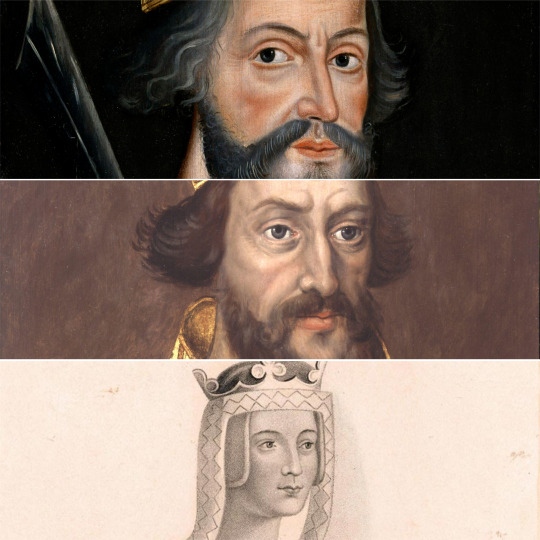
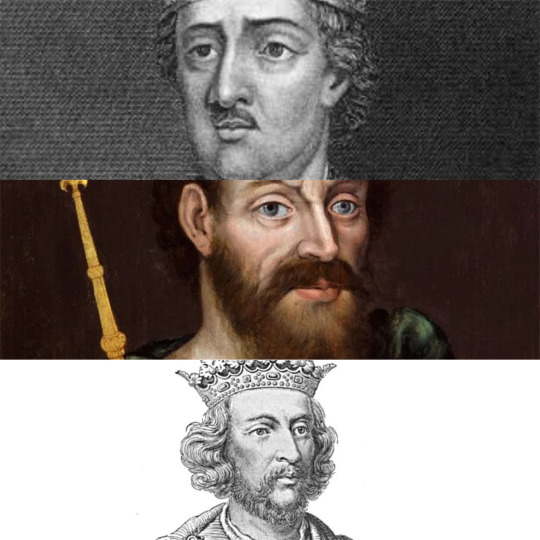

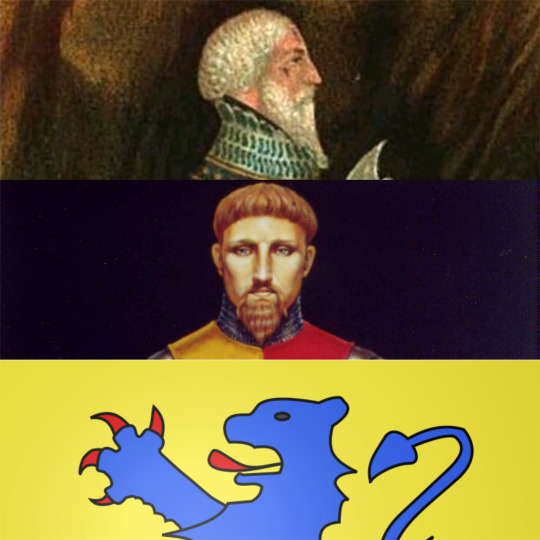


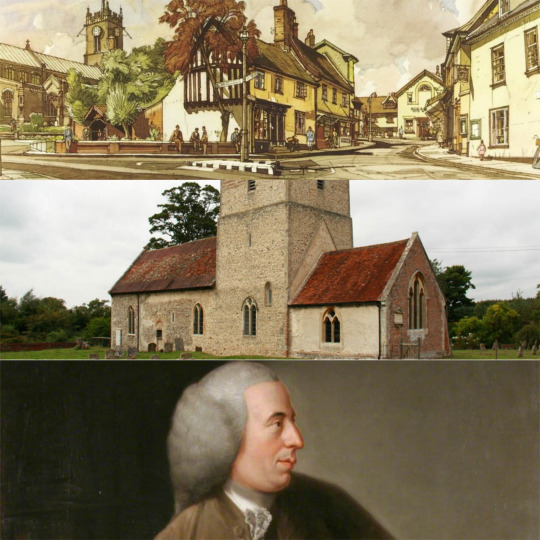
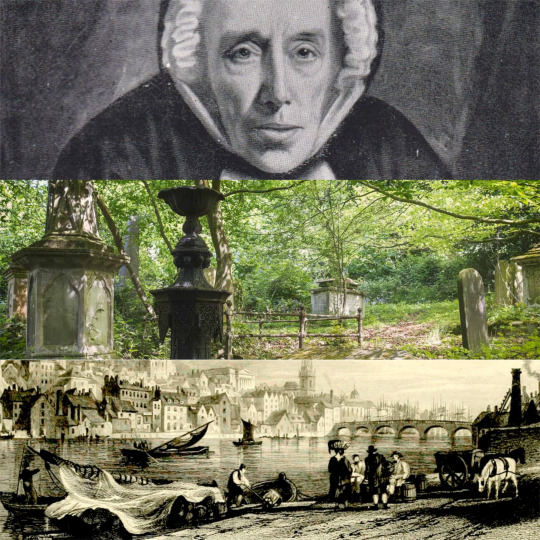
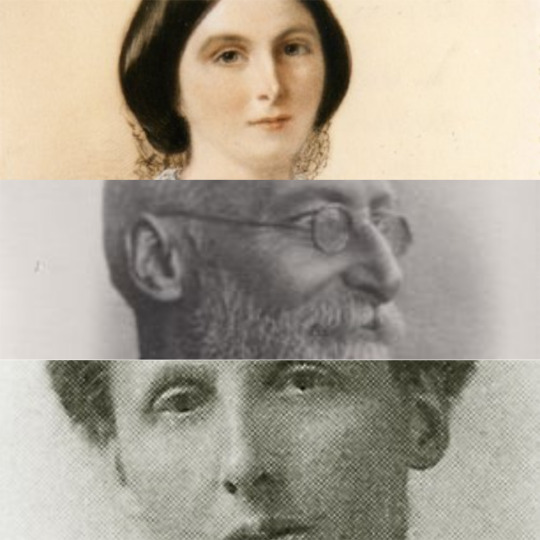

William, The Conqueror to Catherine, The Princess of Wales ⤜ The Princess of Wales is William I's 27th Great-Granddaughter via her paternal grandfather’s line.
William the Conqueror (m. Matilda of Flanders)
Henry I, King of England (m. Matilda of Scotland)
Empress Matilda (m. Geoffrey V, Count of Anjou)
Henry II, King of England (m. Eleanor of Aquitaine)
John I, King of England (m. Isabella of Angoulême)
Henry III, King of England (m. Eleanor of Provence)
Edmund, Earl of Lancaster (m. Blanche of Artois)
Henry, 3rd Earl of Leicester and Lancaster (m. Matilda de Chaworth)
Mary of Lancaster, Baroness Percy (m. Henry de Percy, 3rd Lord Percy) - Coat of Arms
Sir Henry Percy, 1st Earl of Northumberland (m. Margaret de Neville)
Sir Henry ‘Hotspur’ Percy (m. Elizabeth Mortimer)
Sir Henry Percy, 2nd Earl of Northumberland (m. Lady Eleanor Neville) - Coat of Arms
Sir Henry Percy, 3rd Earl of Northumberland (m. Eleanor, Baroness Poynings) - Coat of Arms
Lady Margaret Percy (m. Sir William Gascoigne)
Agnes Gascoigne (m. Sir Thomas Fairfax) - Gawthorpe Hall, family seat.
William Fairfax (m. Anne Baker) - Gilling Castle, family seat.
John Fairfax (m. Mary Birch) Master of the Great Hospital at Norwich, Norfolk
Rev. Benjamin Fairfax (m. Sarah Galliard), Preacher at Rumburgh, Suffolk.
Benjamin Fairfax (m. Bridget Stringer) died in Halesworth, Suffolk.
Sarah Fairfax (m. Rev. John Meadows) died in Ousedon, Suffolk.
Philip Meadows (m. Margaret Hall)
Sarah Meadows (m. Dr. David Martineau)
Thomas Martineau (m. Elizabeth Rankin) buried at Rosary Cemetery, Norwich.
Elizabeth Martineau (m. Dr. Thomas Michael Greenhow) died in Newcastle upon Tyne, Northumberland.
Frances Elizabeth Greenhow (m. Francis Lupton)
Francis Martineau Lupton (m. Harriet Albina Davis)
Olive Christina Lupton (m. Richard Noel Middleton)
Peter Francis Middleton (m. Valerie Glassborow)
Michael Francis Middleton (m. Carole Elizabeth Goldsmith)
The Princess of Wales m. The Prince of Wales
#this took wayyy to long#princess of wales#william the conqueror#history#ancestry#pictures#people#brf#british royal family#empress matilda#henry ii#henry i#john i#king of england#henry iii#hotspur#KTD
104 notes
·
View notes
Text
loki/william rufus fic, where bill explains that as the second son he has inherited england while big brother bob only got the duchy of normandy, ha ha ha.

#no offence to normandy of course i'm sure it's a fine duchy with many things to recommend it.#oh but wait! England Son then dies in a “Hunting Accident” and the next brother heads for the capital ASAP!#where is Bob? idk i think he was on crusade or something. BUT! he'll get to stay in england when henry keeps him captive for life <3#apparently robert got very into welsh poetry while imprisoned for being the older brother so maybe that made up for it all?#PLOT TWIST: henry the first of england leaves no legitimate sons and england ends up having a civil war when he dies.#btw it still throws me a bit that post-conquest kings have names like william and robert while the pre-1066 dudes are all named Aethelthing#*whispers* i kind of feel like asgard should be on a atheling system like pre-conquest england but i don't want to complicate things.#though this would explain why Thor 1 treats a Loki succession as a real possibility and thinks aptitude for kingship in any way matters.#whereas the later movies all assume it works on primogeniture (and none of us in fandom really absorbed the fact that when hela shows up#thor instantly accepts that she's ahead of him in the line of succession and objects to her evilness rather than her sex/gender.#so clearly if thor and loki have an older sister the OLDER matters more than the SISTER. right? yet sif is the only female warrior.#and while i think the 'kings NEED to go into battle!' thing was overstated by the past and by modern observers we do all go along with that#in the context of these films don't we? loki is unsuitable due to his *checks notes* weak fragile feminine form.#*looks at him and experiences a brief moment of cognitive dissonance before moving on*#and that's a story more of us want to tell (or i assume that's what's up) so we all just ignore The Hela Evidence don't we?)#(i can explain my own reasons if anyone asks but nobody will so i won't bother doing it in these tags.)#btw a friend once made a william the conqueror joke about passing the duchy on the left hand side which was FANSTASTIC#but explaining it would take far too long so i won't do that either. BUT IT WAS RLY FUNNY U GUYS (gender-neutral)!#history shitposting#plus the mcu because of course
6 notes
·
View notes
Text
The Plantagenets: A Dynasty that Shaped Medieval England
The Plantagenets were one of the most powerful and influential royal dynasties in medieval England. Spanning over three centuries (from the 12th to the 15th century), their reign left a lasting mark on the country's politics, society, and culture. From the rise of the English monarchy in the wake of the Norman Conquest to the Wars of the Roses, the Plantagenets played a central role in shaping the course of English history.

Origins of the Plantagenet Dynasty
The name "Plantagenet" is believed to be derived from a nickname used by Geoffrey V, Count of Anjou, who is often credited as the first Plantagenet monarch. The term "Plantagenet" comes from the Latin planta genista, which refers to a sprig of broom, a plant commonly worn in the hat of Geoffrey V. His son, Henry II, became the first English monarch of the Plantagenet line when he ascended the throne in 1154.
Geoffrey’s marriage to Matilda, the daughter of King Henry I of England, united the English and Norman royal bloodlines with the powerful Angevin territories in France. Their son, Henry II, inherited both the English crown and vast lands across France, establishing the Plantagenets as a dominant force in both kingdoms.
The Reign of Henry II and the Rise of the Plantagenet Power
Henry II (reigned 1154–1189) is often considered the first true Plantagenet king. His reign saw significant expansion of royal power and the strengthening of England's legal and administrative systems. He introduced a system of common law that would shape the English legal tradition for centuries to come. However, his reign was also marked by conflict, notably with his own sons, who rebelled against him in the famous "Rebellion of the Kings."
One of the most enduring legacies of Henry II’s reign was his involvement in the turbulent relationship with Thomas Becket, the Archbishop of Canterbury. Becket’s murder in 1170, allegedly spurred by Henry’s frustrations with the Archbishop’s opposition to royal authority, made Becket a martyr and led to widespread religious and political ramifications for the Plantagenet dynasty.
The Plantagenets and the Hundred Years' War
As the centuries passed, the Plantagenet family expanded its control beyond England. The Hundred Years' War (1337–1453) between England and France was one of the most defining conflicts of the medieval period, largely defined by the Plantagenet claim to the French throne. The war, which spanned multiple generations, was a bitter struggle for control of French territories that had been held by the English monarchs through dynastic marriage and conquest.
The conflict began under Edward III, who claimed the French throne through his mother, Isabella of France, and sought to assert English dominance in France. The war was a series of intermittent conflicts and truces, marked by famous battles such as the Battle of Agincourt (1415), where Henry V secured a decisive victory against the French forces. The war ultimately ended in defeat for the English under Henry VI, when England lost most of its French territories, leading to a decline in Plantagenet power.
The Plantagenets' Demise: The Wars of the Roses
By the late 14th century, the Plantagenets faced increasing internal division. Rival branches of the family, notably the Houses of Lancaster and York, began to fight for control of the throne in what became known as the Wars of the Roses (1455–1487). This bloody civil war was sparked by the weak reign of Henry VI, whose mental instability and ineffectiveness left the throne vulnerable to competing claims.
The conflict saw the rise of famous figures such as Richard III, the last Plantagenet king, and Henry Tudor, the founder of the Tudor dynasty. After a series of battles, Henry Tudor defeated Richard III at the Battle of Bosworth Field in 1485, ending the Plantagenet reign. Henry VII, who would later marry Elizabeth of York, uniting the warring factions, became the first monarch of the Tudor dynasty.
Legacy of the Plantagenets
The Plantagenet dynasty’s reign over England left a profound legacy that shaped the medieval world. Their long rule influenced nearly every aspect of English society, including the legal system, the economy, and the arts. The introduction of the common law system under Henry II laid the foundation for England’s modern legal framework. Their territorial ambitions and military engagements set the stage for centuries of conflict and expansion in Europe.
The Plantagenets also left an indelible mark on English culture, with their patronage of architecture, literature, and the arts. The Gothic style of architecture flourished under their reign, with iconic buildings such as Westminster Abbey and the Tower of London being built or expanded during this period.
While the Plantagenet dynasty came to an end in 1487, their impact on England and the wider world is still felt today. The tumultuous events of the Wars of the Roses, the central role of the Plantagenets in the Hundred Years' War, and their legacy as a royal family full of complex, larger-than-life figures continue to capture the imagination of historians and the public alike.
In essence, the Plantagenets were not just rulers of a kingdom but influential players in a turbulent medieval world, whose actions reverberated far beyond their reign.
Conclusion
The Plantagenet dynasty’s history is a rich tapestry of triumphs, tragedies, and power struggles. From the reign of Henry II to the fall of Richard III, the family played a pivotal role in shaping not only the English throne but also the history of Europe. Whether through military conquests, legal reforms, or their colorful personalities, the Plantagenets remain one of the most fascinating dynasties in world history.
#plantagenets#queen matilda#eleanor of aquitaine#richard the lionheart#robert the wayward prince#william the conqueror#king richard of england#wars of the magna carta#civil war in england#king john#robert curthose history
6 notes
·
View notes
Text
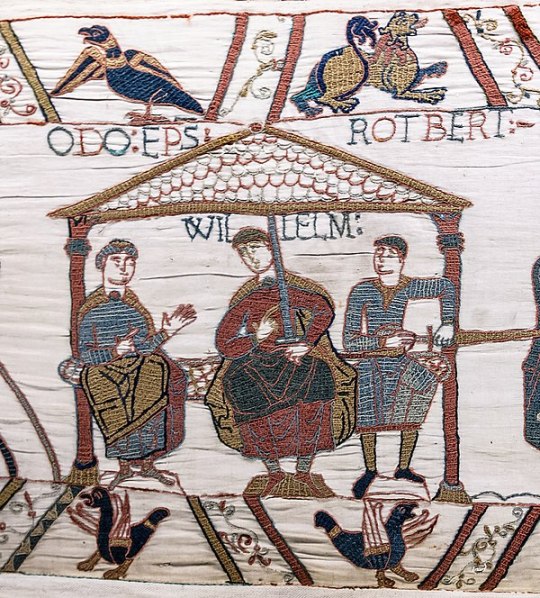

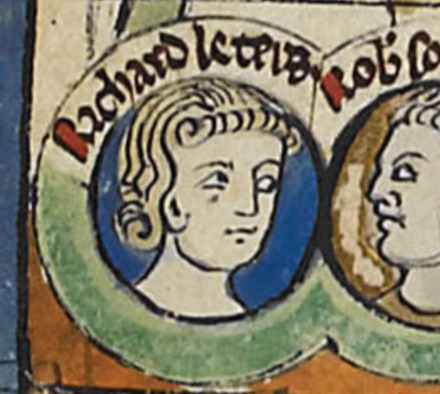
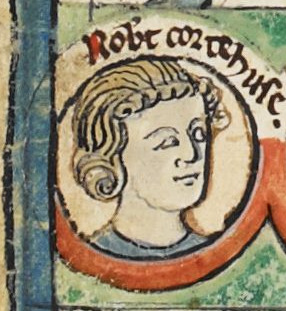
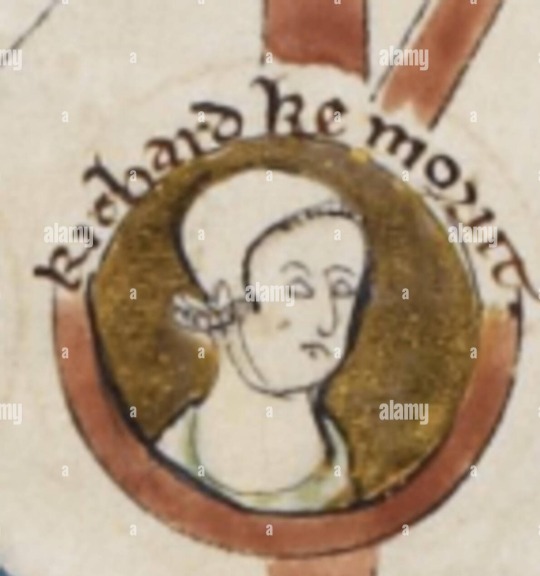
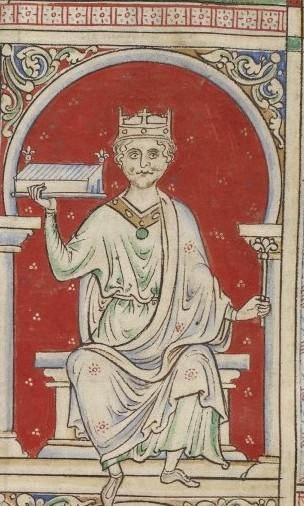

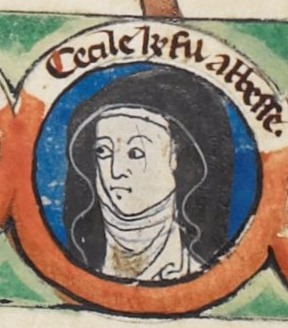


The Bastard Kings and their families
This is series of posts are complementary to this historical parallels post from the JON SNOW FORTNIGHT EVENT, and it's purpouse to discover the lives of medieval bastard kings, and the following posts are meant to collect portraits of those kings and their close relatives.
In many cases it's difficult to find contemporary art of their period, so some of the portrayals are subsequent.
1) William I of England (c. 1028 – 1087), son of Robert I of Normandy and Herleva of Falaise; with his brothers Odo of Bayeux (d. 1097) and Robert of Mortain (c. 1031–c. 1095), sons of Herleva of Falaise and her husband Herluin de Conteville
2) His father, Robert I of Normandy (1000 –1035), son of Richard II of Normandy and his wife Judith of Brittany
3) His uncle, Richard III of Normandy (997/1001 – 1027), son of Richard II of Normandy and his wife Judith of Brittany
4) His son, Robert II of Normandy (c. 1051 – 1134), son of William I of England and Matilda of Flanders
5) His son, William II of England( c. 1057 – 1100), son of William I of England and Matilda of Flanders
6) His son, Henry I of England (c. 1068 –1135), son of William I of England and Matilda of Flanders
7) His daughter, Cecily of Normandy (c. 1056 – 1126), daughter of William I of England and Matilda of Flanders
8) His daughter, Constance of Normandy (c. 1057/61– 1090), daughter of William I of England and Matilda of Flanders
9) His daughter, Adela of Normandy (c. 1067– 1137), daughter of William I of England and Matilda of Flanders
#jonsnowfortnightevent2023#asoiaf#a song of ice and fire#day 10#echoes of the past#historical parallels#medival bastard kings#bastard kings and their families#william i of england#william the conqueror#odo of bayeux#robert of mortain#robert i of normandy#richard iii of normandy#robert ii of normandy#william ii of england#henry i of england#cecily of normandy#adela of normandy#constance of normandy#canonjonsnow
11 notes
·
View notes
Text
"Bro it's just a prank!"
The prank:

#mfw my brothers dumping poopoo and peepee on my head causes me to be out of the country#leading to my younger brother becoming king and completely reshaping european history for the next millennium#i mean it's possible robert would've done something else to have to leave england and henry would've become king anyway#but i just think it's wild that we live in the timeline where two younger siblings dumping poop on their brother's head is a canon event#that literally reshaped the entire history of the western world as a butterfly effect#medieval history#medieval england#william the conqueror#history#did you know#fun facts#robert curthose#henry i#english history#it's just a prank#the prank
6 notes
·
View notes
Text
HOLY F***!!


It's HIM!
It's REALLY HIM!
Ladies and gentlemen, this young boy is the one and only William the Bastard, soon to be known as the Conqueror, future Duke of Normandy and the future first Norman King of England.
They actually showed him!



I cannot believe it. This made my day after finding out about Canute.
Thanks to @emma-ofnormandy for letting me know it.
well, at least we got something.
#vikings#vikings valhalla#vikings valhalla 3x03#vikings william the conqueror#duke william of normandy#king William the Conqueror of England#still bitter they didn't show his conquest of England though#oh well it's better than nothing at all
5 notes
·
View notes
Text
Kings and Churchmen
Kings and Churchmen and why Kings of England needed the support of the Church to hold on to power if they did not have support of nobility
Today, I will be writing and discussing the importance of churchmen who supported kingship during the mediaeval ages, stretching from the fall of the Roman Empire in 476 CE to the discovery of America by Europeans in 1492 CE by Christopher Columbus. For this article, I will be discussing the kingship focus Kings of England, why churchmen were an essential pillar of Kings and a force for support,…

View On WordPress
#Archbishop of Canterbury Lanfranc#Battle of Lincoln#Christopher Columbus#Church and State#Cnut the Great#Earl Robert of Gloucester#English History#King Stephen of England#Kings of England#Lanfranc#William the Conqueror
0 notes
Text

Robert wounding his father William the Conqueror during a battle. By James William Edmund Doyle.
William's elder son Robert, enraged by a prank of his brothers William and Henry, who had doused him with filthy water, undertook what became a large scale rebellion against his father's rule. Only with King Philip's additional military support was William able to confront Robert, who was then based in Flanders. During the battle of 1079, William was unhorsed and wounded by Robert, who lowered his sword only after recognising him.
#james william edmund doyle#william the conqueror#king of england#norman kings#kingdom of england#engraving#Robert Curthose#duke of normandy#duc de normandie#Guillaume le Conquérant#royaume de france#duché de normandie#Robert Courteheuse#première croisade#engravings#father and son#in armour
4 notes
·
View notes
Text
You see, It all started in my childhood. That fucker William kicked my kin out from our home. While I have been given a long life, I hate him. I hate what he has done to my tongue. Now, after many years! I have the speechlore to remove his blight on my tongue! Wait! That’s l'interrupteur de marche arrière. Putain ! Je parle maintenant sa langue maudite.
#I decided a supervillain who wants to remove French words from English out of personal hatred for William the Conqueror would be funny#he also dislikes the current royal family; not because he is anti monarchy#but because they ultimately trace their claim to the throne of England through William#the guy he maintains is the true king of England is a plumber in Bristol
0 notes
Text
A central element of the myth of [Eleanor of Aquitaine] is that of her exceptionalism. Historians and Eleanor biographers have tended to take literally Richard of Devizes’s conventional panegyric of her as ‘an incomparable woman’. She is assumed to be a woman out of her time. […] Amazement at Eleanor’s power and independence is born from a presentism that assumes generally that the Middle Ages were a backward age, and specifically that medieval women were all downtrodden and marginalized. Eleanor’s career can, from such a perspective, only be explained by assuming that she was an exception who rose by sheer force of personality above the restrictions placed upon twelfth-century women.
— Michael R. Evans, Inventing Eleanor: The Medieval and Post-Medieval Image of Eleanor of Aquitaine
The idea of Eleanor’s exceptionalism rests on an assumption that women of her age were powerless. On the contrary, in Western Europe before the twelfth century there were ‘no really effective barriers to the capacity of women to exercise power; they appear as military leaders, judges, castellans, controllers of property’. […] In an important article published in 1992, Jane Martindale sought to locate Eleanor in context, stripping away much of the conjecture that had grown up around her, and returning to primary sources, including her charters. Martindale also demonstrated how Eleanor was not out of the ordinary for a twelfth-century queen either in the extent of her power or in the criticisms levelled against her.
If we look at Eleanor’s predecessors as Anglo-Norman queens of England, we find many examples of women wielding political power. Matilda of Flanders (wife of William the Conqueror) acted as regent in Normandy during his frequent absences in England following the Conquest, and [the first wife of Henry I, Matilda of Scotland, played some role in governing England during her husband's absences], while during the civil war of Stephen’s reign Matilda of Boulogne led the fight for a time on behalf of her royal husband, who had been captured by the forces of the empress. And if we wish to seek a rebel woman, we need look no further than Juliana, illegitimate daughter of Henry I, who attempted to assassinate him with a crossbow, or Adèle of Champagne, the third wife of Louis VII, who ‘[a]t the moment when Henry II held Eleanor of Aquitaine in jail for her revolt … led a revolt with her brothers against her son, Philip II'.
Eleanor is, therefore, less the exception than the rule – albeit an extreme example of that rule. This can be illustrated by comparing her with a twelfth century woman who has attracted less literary and historical attention. Adela of Blois died in 1137, the year of Eleanor’s marriage to Louis VII. […] The chronicle and charter evidence reveals Adela to have ‘legitimately exercised the powers of comital lordship’ in the domains of Blois-Champagne, both in consort with her husband and alone during his absence on crusade and after his death. […] There was, however, nothing atypical about the nature of Adela’s power. In the words of her biographer Kimberley LoPrete, ‘while the extent of Adela’s powers and the political impact of her actions were exceptional for a woman of her day (and indeed for most men), the sources of her powers and the activities she engaged in were not fundamentally different from those of other women of lordly rank’. These words could equally apply to Eleanor; the extent of her power, as heiress to the richest lordship in France, wife of two kings and mother of two or three more, was remarkable, but the nature of her power was not exceptional. Other noble or royal women governed, arranged marriages and alliances, and were patrons of the church. Eleanor represents one end of a continuum, not an isolated outlier.
#It had to be said!#eleanor of aquitaine#historicwomendaily#angevins#my post#12th century#gender tag#adela of blois#I think Eleanor's prominent role as dowager queen during her sons' reigns may have contributed to her image of exceptionalism#Especially since she ended up overshadowing both her sons' wives (Berengaria of Navarre and Isabella of Angouleme)#But once again if we examine Eleanor in the context of her predecessors and contemporaries there was nothing exceptional about her role#Anglo-Saxon consorts before the Norman Conquest (Eadgifu; Aelfthryth; Emma of Normandy) were very prominent during their sons' reigns#Post-Norman queens were initially never kings' mothers because of the circumstances (Matilda of Flanders; Edith-Matilda; and#Matilda of Boulogne all predeceased their husbands; Adeliza of Louvain never had any royal children)#But Eleanor's mother-in-law Empress Matilda was very powerful and acted as regent of Normandy during Henry I's reign#Which was a particularly important precedent because Matilda's son - like Eleanor's sons after him - was an *adult* when he became King.#and in France Louis VII's mother Adelaide of Maurienne was certainly very powerful and prominent during Eleanor's own queenship#Eleanor's daughter Joan's mother-in-law Margaret of Navarre had also been a very powerful regent of Sicily#(etc etc)#So yeah - in itself I don't think Eleanor's central role during her own sons' reigns is particularly surprising or 'exceptional'#Its impact may have been but her role in itself was more or less the norm
430 notes
·
View notes
Text
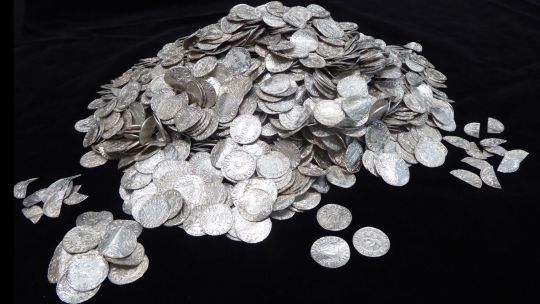
1,000-Year-Old Norman Conquest Coin Hoard Sells for $5.6 Million
A hoard of Norman-era silver coins unearthed five years ago in southwestern England has become Britain’s most valuable treasure find ever, after it was bought for £4.3 million ($5.6 million) by a local heritage trust.
For the group of seven metal detectorists who discovered the 2,584 silver pennies in the Chew Valley area, about 11 miles south of the city of Bristol, it marks a lucrative windfall since they will pocket half that sum. The landowner on whose property the coins were found will receive the other half.
According to South West Heritage Trust, the body that acquired them, the coins date from around 1066-1068, spanning one of the most turbulent periods in English history as the country was successfully invaded for the last time during the Norman Conquest.
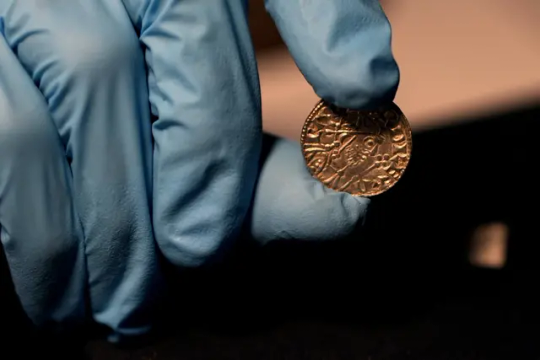
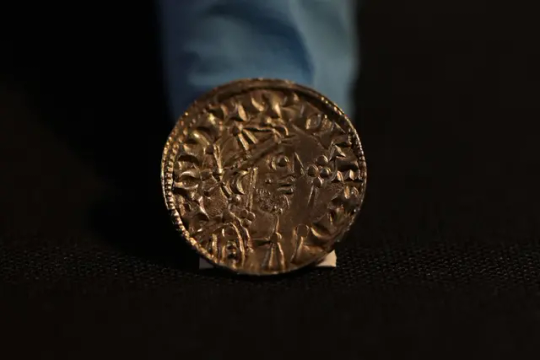
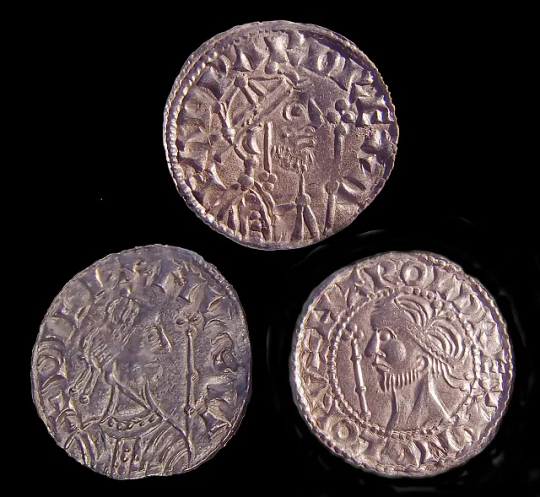
One coin, the oldest in the hoard, depicts King Edward the Confessor, who died childless in January 1066, triggering a period of instability since he had promised the throne to three claimants: Harold Godwinson, Earl of Wessex; Harald Hardrada, King of Norway; and William, Duke of Normandy.
Edward named Harold Godwinson as his successor on his deathbed, but the newly crowned King Harold II faced challenges from the other two claimants to the throne, and he was eventually defeated by William at the Battle of Hastings in October 1066.
The hoard of coins depicts this turmoil as Harold II features on just under half of them while William I (also known as William the Conqueror) features on the rest.
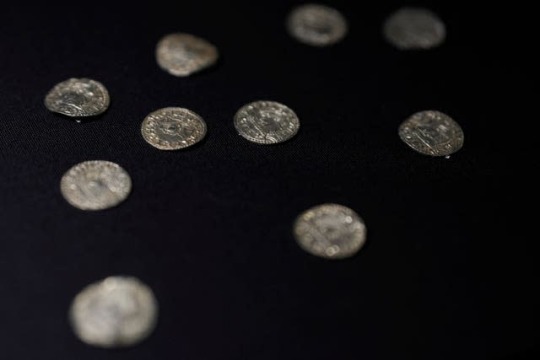
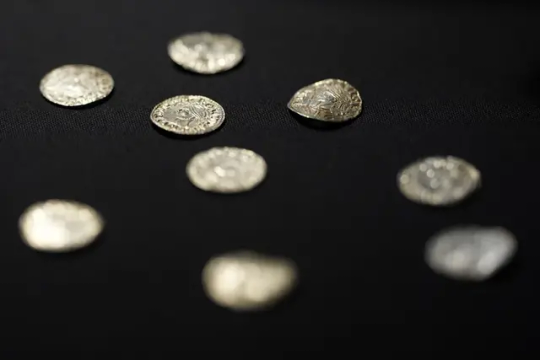
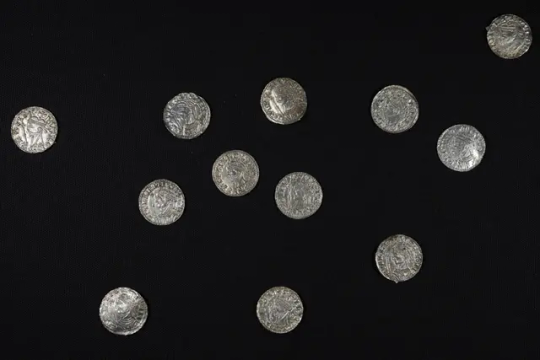
“It comes from a turning point in English history and it encapsulates the change from Saxon to Norman rule,” Amal Khreisheh, curator of archaeology at South West Heritage Trust, said in a video on the organization’s website.
“The hoard was buried in around 1067-1068 on an estate in Chew Valley which later belonged to Giso, the Bishop of Wells. We think it was probably buried for safekeeping during the time of rebellions against William in the South West.
“We know that in 1068, the people of Exeter rebelled against William. At around this time, Harold’s sons returned from exile in Ireland and their forces mounted attacks around the River Avon and then down into Somerset and the Chew Valley,” Khreisheh added.
Finding coins that were in use almost 1,000 years ago is exceptionally rare – this hoard contains twice as many coins from during Harold II’s reign as had previously been found.
The coins will now go on public display at the British Museum in London from November 26, before heading back to museums in southwest England.
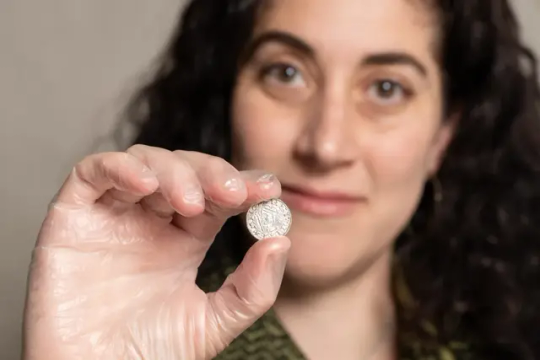
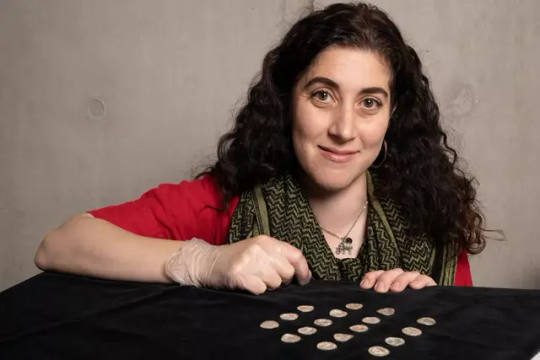
#1000-Year-Old Norman Conquest Coin Hoard Sells for $5.6 Million#Norman Conquest Coin Hoard#Norman Conquest#King Edward the Confessor#King Harold II#William Duke of Normand#William the Conqueror#treasure#silver#silver coins#collectable coins#metal detector#metal detecting finds#ancient artifacts#archeology#archeolgst#history#history news#ancient history#ancient culture#ancient civilizations
220 notes
·
View notes